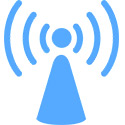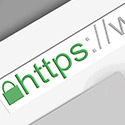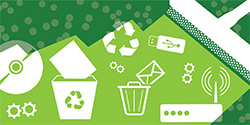
A Special Note Regarding Your Privacy: We will NEVER email, text, or otherwise contact you and ask you for your username, password, account number, social security number, or other financial credentials. If you should receive a call, email, or text asking for this information, do not respond. Please let us know immediately by calling your local branch.
Online Safety TipsLock Down Your Login
 Fortify your online accounts: Your usernames and passwords are not enough to protect key accounts like banking, e-mail, and social media. Enable the strongest authentication tools available, such as biometrics, security keys, or a unique one-time code sent via e-mail, text message, or telephone.
Fortify your online accounts: Your usernames and passwords are not enough to protect key accounts like banking, e-mail, and social media. Enable the strongest authentication tools available, such as biometrics, security keys, or a unique one-time code sent via e-mail, text message, or telephone.- Create strong passwords: The elements of a strong password are: length (the more characters, the better); a mix of letters (lowercase and UPPERCASE); numbers; and special characters. Avoid using personal information such as nicknames, birthdates, and pet names. Refrain from using common patterns like "1234," "abcd," or "qwerty."
- Unique account, unique password: Having separate passwords for every account helps to thwart cybercriminals. At a minimum, separate your work and personal accounts and make sure that your critical accounts have the strongest passwords.
- Keep passwords secure: If you need to write your password down, store it somewhere that's locked. Consider using a trusted password manager if you need help remembering multiple passwords. Also, do not share passwords.
Personal Information is Like Money - Value It, Protect It
- Know what’s being collected, who is collecting it and how it will be used: Information about you, such as the games you like to play, what you search for online and where you shop and live, has value – just like money. Be thoughtful about who gets that information and how it’s collected through apps and websites. Think twice if an app wants permission to use personal information (like your location) it doesn’t need before you say “OK.”
 Now you see me, now you don't: Some stores and other locations look for devices with WiFi or Bluetooth turned on to track your movements while you are within range. Turn off WiFi and Bluetooth when not in use, and limit your use of free public wireless networks, which stores and locations can use to track what you do online.
Now you see me, now you don't: Some stores and other locations look for devices with WiFi or Bluetooth turned on to track your movements while you are within range. Turn off WiFi and Bluetooth when not in use, and limit your use of free public wireless networks, which stores and locations can use to track what you do online.- Get savvy about WiFi hotspots: Public wireless networks and hotspots are not secure – this means the possibility exists that anyone can see what you are doing on your laptop or smartphone while you are connected to it. Think about what you are doing and if you would want another person to see it. If you use public WiFi a lot, think about using a virtual private network (VPN) that provides a more secure WiFi connection.
When in Doubt, Throw It Out
 Think before you act: Be wary of communications that implore you to act immediately, offers something that sounds too good to be true, or asks for personal information. If an e-mail message looks suspicious, even if you know the source, it’s best to delete or – if appropriate – mark it as junk. If the message is from a familiar and trusted company, contact them using information provided on an account statement, not through the information provided in the e-mail message.
Think before you act: Be wary of communications that implore you to act immediately, offers something that sounds too good to be true, or asks for personal information. If an e-mail message looks suspicious, even if you know the source, it’s best to delete or – if appropriate – mark it as junk. If the message is from a familiar and trusted company, contact them using information provided on an account statement, not through the information provided in the e-mail message.- Check the security of the website as well as the legitimacy: Before sending or entering sensitive information online, be sure that you’re on a secure site (https://). Also, pay attention to the website’s URL. Malicious websites may look identical to a legitimate site, but the URL may use a variation in spelling or a different domain (e.g., .com versus .net).
Keep a Clean Machine
 Keep security software current on all devices that connect to the internet: That includes your PC or laptop at home, cell phones, tablets, and smart appliances and connected devices – such as thermostats, toys, and home assistants. Having the most up-to-date mobile security software, web browser, operating system and apps is the best defense against viruses, malware and other online threats.
Keep security software current on all devices that connect to the internet: That includes your PC or laptop at home, cell phones, tablets, and smart appliances and connected devices – such as thermostats, toys, and home assistants. Having the most up-to-date mobile security software, web browser, operating system and apps is the best defense against viruses, malware and other online threats.- Delete when done: Many of us download apps for specific purposes, such as planning vacations, and no longer need them afterwards, or we may have previously downloaded apps that are no longer useful or interesting to us. It’s a good security practice to delete all apps you no longer use.
Take those steps for keeping a clean machine to reduce your risk of hackers accessing your network and information.






